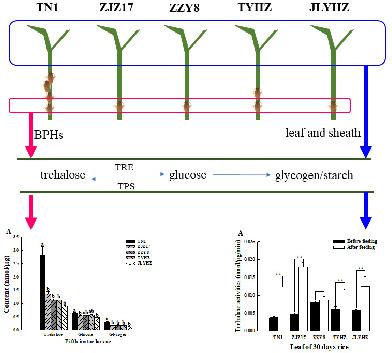当前位置:
X-MOL 学术
›
Physiol. Entomol.
›
论文详情
Our official English website, www.x-mol.net, welcomes your feedback! (Note: you will need to create a separate account there.)
Brown planthopper infestations alter sugar metabolism in the rice plant as well as brown planthopper
Physiological Entomology ( IF 1.5 ) Pub Date : 2021-03-02 , DOI: 10.1111/phen.12356 Yong‐Kang Liu 1 , Wen‐Xuan Xu 1 , Jing‐Jing Xu 1 , Si‐Rui Zheng 1 , Jia‐Jie Yan 1 , Yu‐Tong Ding 1 , Bo Shen 1 , Bin Tang 1
Physiological Entomology ( IF 1.5 ) Pub Date : 2021-03-02 , DOI: 10.1111/phen.12356 Yong‐Kang Liu 1 , Wen‐Xuan Xu 1 , Jing‐Jing Xu 1 , Si‐Rui Zheng 1 , Jia‐Jie Yan 1 , Yu‐Tong Ding 1 , Bo Shen 1 , Bin Tang 1
Affiliation

|
Carbohydrate plays an important role in rice resistance or tolerance to pests, and also affects the continuous feeding of brown planthoppers (BPHs) on rice. However, the change in the sugar metabolism of BPH and rice plant after BPH infestation is not well studied. In this study, the rice variety Taichung Native 1 (TN1) was taken as a control group, and four kinds of common rice varieties in Zhejiang province (China), Zhong Jiazao 17 (ZJZ17), Zhong Zheyou 8 (ZZY8), Tian Youhuazhan (TYHZ), and Jing Liangyouhuazhan (JLYHZ), were taken as experimental group. The results showed that the BPHs best preferred the TN1 rice variety. BPHs in fifth instar feeding on the other four rice varieties had lower levels of trehalose, glucose, and glycogen, and the difference in sugar levels further resulted in differences in trehalose‐6‐phosphate synthase and trehalase expression and trehalase activity. In addition, after BPHs infestation, the glucose content in the sheath at 30 days decreased, while it increased in the sheath at 60 days. Moreover, the trehalose content in the sheath at 30 and 60 days decreased. The starch in the leaves at 60 days also decreased. This study demonstrated that both BPHs and rice plant showed changes in carbohydrate metabolism after BPHs feeding on rice, but these changes varied with rice varieties and rice growth stage. These results provide a basis for a better understanding the physiological interaction between BPH and rice plant.
更新日期:2021-05-05


























 京公网安备 11010802027423号
京公网安备 11010802027423号